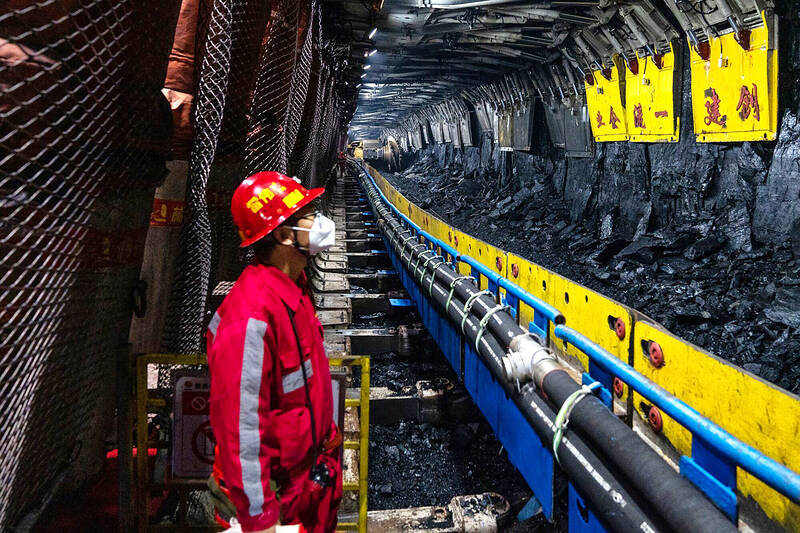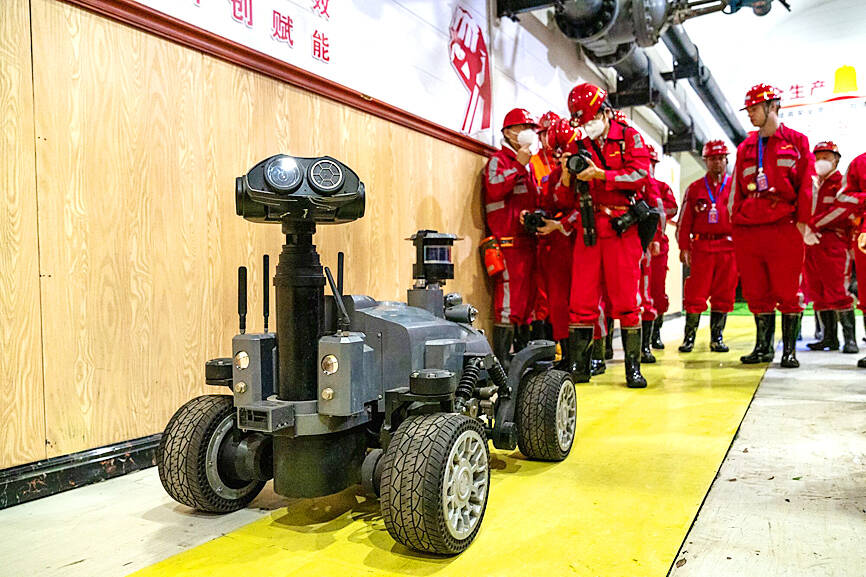One hundred meters underground inside a pit in northern China, miners extract lumps of coal with the flick of a finger on a smartphone, as the country tries to drag the traditionally dangerous and dirty work into the digital era.
The Hongliulin “intelligent mine” in coal-belt Shaanxi Province is a flagship facility in a drive to modernize China’s thousands of coal mines, even as the nation pledges to peak greenhouse gas emissions by 2030.
China is the world’s biggest emitter of the pollutants driving climate change, and its promises to curb them are essential to keeping global temperature rises below 2°C.

Photo: Bloomberg
However, mine digitalization — which aims to improve safety and productivity — shows the continued importance of coal in a country that last year produced nearly 60 percent of its electricity from the fossil fuel.
Smart mines are common in other coal-producing nations such as Canada, but China has lagged and the government is aiming to achieve basic digitalization of all mines by 2035.
On a tour organized by telecom giant Huawei Technologies Co (華為) — whose technology underpins the changes at Hongliulin — journalists saw sensors, smart cameras and 5G relay boxes crisscrossing the facility.

Photo: Bloomberg
Inside a control room crammed with screens displaying numbers, graphs and images, technical manager Wang Lei (王磊) said he could monitor the air, temperature and other data in real time.
Digitalization “has reduced the intensity of our work,” said 33-year-old electrician Ruan Banlin, who has worked in the mine for 10 years.
Huawei said the new methods had increased output per shift by almost one-third.
That is good news for China’s energy grid — but not the planet.
Greenpeace this week reported that Beijing has approved a surge in coal power this year, green-lighting as much in the first three months as for the whole of 2021.
“We’re seeing a decrease in the number of coal mines, while the clustering of production increases along with total output,” Greenpeace East Asia climate and energy campaigner Xie Wenwen (謝雯文) said.
Asked about smart mining, Xie said it should be scrutinized closely.
“Obviously the safest thing we can do is leave the coal in the ground. That goes for climate as well as other risks,” she said.
China had 4,400 coal mines at the end of last year, official data showed.
If it delivers on emissions pledges, those mines would be operating at minimum capacity and at a loss over the coming decades, Greenpeace said.
Huawei’s involvement suggests China is betting on coal retaining its importance in fuel supply for years.
The company — whose net profit fell 69 percent year-on-year last year — is diversifying after US sanctions over cybersecurity and espionage concerns hammered its business.
Xu Jun (徐軍), head of mining digitalization for Huawei, said that many competitors were setting up teams in the field.
“The investment in smart mining solutions is not contradictory to Huawei’s investment in clean energy,” the firm said.
“Worldwide, coal and clean energy use will coexist for a long time. The trend of intelligence in related industries is unstoppable,” it said.
Safety is a major concern in the industry, where last year 245 people died in 168 incidents, official data showed.
In February, a mine collapse in northern China killed about 50 people.
At Hongliulin, data on extraction, miner location and danger detection is centralized on a system designed to eliminate problems caused by human error and miscommunication.
Instead of people, robots patrol and inspect the dark and narrow underground corridors.
“It is much better now,” Ruan said. “The underground mine is almost as safe as the ground.”
The management says the underground team has been cut 40 percent — although not the overall workforce — and only essential maintenance miners descend into the pit.
“We aim to achieve the ultimate goal of completely unmanned underground production,” said Shi Chao (石超), director of the mine’s intelligence department.

With an approval rating of just two percent, Peruvian President Dina Boluarte might be the world’s most unpopular leader, according to pollsters. Protests greeted her rise to power 29 months ago, and have marked her entire term — joined by assorted scandals, investigations, controversies and a surge in gang violence. The 63-year-old is the target of a dozen probes, including for her alleged failure to declare gifts of luxury jewels and watches, a scandal inevitably dubbed “Rolexgate.” She is also under the microscope for a two-week undeclared absence for nose surgery — which she insists was medical, not cosmetic — and is

CAUTIOUS RECOVERY: While the manufacturing sector returned to growth amid the US-China trade truce, firms remain wary as uncertainty clouds the outlook, the CIER said The local manufacturing sector returned to expansion last month, as the official purchasing managers’ index (PMI) rose 2.1 points to 51.0, driven by a temporary easing in US-China trade tensions, the Chung-Hua Institution for Economic Research (CIER, 中華經濟研究院) said yesterday. The PMI gauges the health of the manufacturing industry, with readings above 50 indicating expansion and those below 50 signaling contraction. “Firms are not as pessimistic as they were in April, but they remain far from optimistic,” CIER president Lien Hsien-ming (連賢明) said at a news conference. The full impact of US tariff decisions is unlikely to become clear until later this month

GROWING CONCERN: Some senior Trump administration officials opposed the UAE expansion over fears that another TSMC project could jeopardize its US investment Taiwan Semiconductor Manufacturing Co (TSMC, 台積電) is evaluating building an advanced production facility in the United Arab Emirates (UAE) and has discussed the possibility with officials in US President Donald Trump’s administration, people familiar with the matter said, in a potentially major bet on the Middle East that would only come to fruition with Washington’s approval. The company has had multiple meetings in the past few months with US Special Envoy to the Middle East Steve Witkoff and officials from MGX, an influential investment vehicle overseen by the UAE president’s brother, the people said. The conversations are a continuation of talks that

CHIP DUTIES: TSMC said it voiced its concerns to Washington about tariffs, telling the US commerce department that it wants ‘fair treatment’ to protect its competitiveness Taiwan Semiconductor Manufacturing Co (TSMC, 台積電) yesterday reiterated robust business prospects for this year as strong artificial intelligence (AI) chip demand from Nvidia Corp and other customers would absorb the impacts of US tariffs. “The impact of tariffs would be indirect, as the custom tax is the importers’ responsibility, not the exporters,” TSMC chairman and chief executive officer C.C. Wei (魏哲家) said at the chipmaker’s annual shareholders’ meeting in Hsinchu City. TSMC’s business could be affected if people become reluctant to buy electronics due to inflated prices, Wei said. In addition, the chipmaker has voiced its concern to the US Department of Commerce